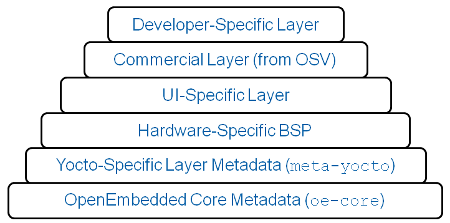Yocto 1.0 integrates OpenEmbedded and Linaro code
Apr 6, 2011 — by Eric Brown — from the LinuxDevices Archive — 7 viewsThe Linux Foundation announced the availability of the Yocto Project Release 1.0, which includes a version of OpenEmbedded's bitbake build system, major improvements to its developer interface, and Linaro technology for improved ARM support. The Linux Foundation also announced new Yocto Steering Group members Dell and Mentor Graphics to help oversee the embedded Linux standardization project.
Launched in October with a 0.9 release, the Yocto Project aims to provide open source tools to help companies make custom, Linux-based embedded systems for ARM, MIPS, PowerPC, and x86 architectures. Hosted by the Linux Foundation (LF), the project was announced at today's Linux Foundation Collaboration Summit.
The Yocto Project Release 1.0 is based on Linux kernel 2.6.37 and consists of the following new features, says the project:
- new process for gathering, compiling and building from upstream source code
- system toolchain bootstrapping and machine specific sysroot
- faster builds and better performance with speed improvements to bitbake
- updated GCC toolchain (v4.5.1)
- new Application Development Toolkit (ADT) installer and Application Development Guide
- updates to the X Windows System, improving security for target devices
- open source Linux 2.6.37 commands, libraries and middleware
- board support packages (BSPs) for the Atheros RouterStationPro, Freescale's MPC8315E, Intel's Atom, and Texas Instruments' OMAP, among others
- new layer that includes the latest release of the Linaro kernel and toolchain for ARM processors, resulting in increased hardware compatibility
The bitbake build system noted above is borrowed from the OpenEmbedded project. In early March, the Yocto Project announced it was aligning its technology with OpenEmbedded, which offers a popular build framework for embedded Linux. At the time, the LF said the Yocto Project would be "merging technology" with the OpenEmbedded community and "extending governance to include OpenEmbedded representatives."
In addition, the projects will share a common OpenEmbedded Core (OE-Core) metadata foundation comprised of software build recipes and core Linux components. This will be key to "preventing fragmentation and reinforcing the OpenEmbedded methodology as an open standard for embedded Linux build systems," said the LF at the time.
Despite the shift to the OpenEmbedded bitbake build system, Yocto still borrows heavily from its initial Poky Linux foundation, although Poky is now an integration layer on top of OE-Core.

Yocto 1.0 metadata architecture (preliminary)
Now, the company says that the Steering Group will also include Dell as well as ARM- and MIPS-oriented embedded Linux firm Mentor Graphics.
According to Yocto developer David Stewart, who announced the release on the Yocto project site, the biggest changes from the previous 0.9 release included "the rewrite of bitbake's fetcher (to improve the 'out of box' experience), addition of an installer script for our application development tools and an initial set of Board Support Packages."
Stewart also noted the importance of the new Steering Group, writing "In our first Steering Group meeting, the common theme expressed by most of the members was keeping the open source and commercial versions aligned. This will save us all so much because we won't be duplicating effort on build systems, endlessly porting BSPs, generally work that doesn't make us any money."
Reaching out to ARM via Linaro integration
While the OpenEmbedded integration should be popular among ARM developers, Yocto's more limited alignment with the Linaro project — embedding the Linaro kernel and toolchain — is a further indication the project aims to bring in ARM developers.
Linaro is a somewhat similar embedded Linux standardization project, but is focused on ARM Cortex platforms. What's more, instead of launching Linaro as an open source project, ARM and its semiconductor partners, which include TI and Freescale, set up the effort as a not-for-profit development company.
Last month, Freescale joined a list of other semiconductor vendors, many of them MIPS vendors, vowing support for Yocto. These included Cavium Networks, LSI, Mindspeed, NetLogic Microsystems, TI, and Tilera.
In addition to releasing Yocto 1.0, the Yocto Project is meeting this week at the Linux Foundation Collaboration Summit and next week at the Embedded Linux Conference. Other Linux Foundation (LF) announcements today included the release of Carrier Grade Linux 5.0.
In addition to the following statements, Yocto testimonials were offered by Dell, Intel, OpenEmbedded eV, Timesys, and Wind River.
Stated Glenn Perry, general manager, Mentor Graphics Embedded Software Division, "The Yocto Project represents a massive collaboration among the embedded Linux community's most important stakeholders."
Stated Jason Kridner, Chief Software Technologist, Texas Instruments ARM Microprocessor Business, "OpenEmbedded is a very popular choice among BeagleBoard.org community software developers and is utilized within TI to design many of our own software development kits. The alignment with OpenEmbedded will drastically increase open source collaboration efforts."
Availability
Yocto 1.0 is available for free download now, available from links in this Yocto 1.0 blog announcement.
This article was originally published on LinuxDevices.com and has been donated to the open source community by QuinStreet Inc. Please visit LinuxToday.com for up-to-date news and articles about Linux and open source.